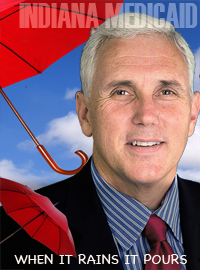| Is Indiana Governor Mike Pence Falling into ObamaCare’s Medicaid Trap? |
 |
|
By Ashton Ellis
Wednesday, May 28 2014 |
Indiana Republican Governor Mike Pence says his plan to use ObamaCare’s Medicaid dollars to expand his state’s health savings account program won’t create a new open-ended entitlement. Before considering Pence’s arguments, it’s important to understand how ObamaCare changes Medicaid. If states expand Medicaid eligibility to people making up to 138 percent of the federal poverty line (FPL), ObamaCare will pay 100 percent of the costs for covering the “new-eligibles.” After three years, the federal government will pay for 90 percent. In light of this, 26 states and the District of Columbia have chosen to expand Medicaid eligibility to draw down more federal money. Pence wants to use ObamaCare’s Medicaid expansion dollars to expand the Healthy Indiana Plan (HIP), a health savings account for the poor initiated by his predecessor Mitch Daniels. HIP caps the amount of government contributions to an individual’s account, and includes a measure of cost-sharing that incents HIP users to shop for the best health care bargains. Since taking office in 2013, Pence has negotiated with the Obama administration to allow Indiana to expand HIP rather than traditional Medicaid. On May 15, Pence unveiled his proposal. “There are two futures in health care – government-directed health care or consumer-driven health care,” he said in a statement. HIP 2.0 would cover dental, vision and maternity benefits. It would also remove current enrollment limits in the program so that all Medicaid eligible Hoosiers could access Pence’s plan. Indiana residents making between 100 and 138 percent of FPL would be required to contribute financially to their HIP 2.0 account, or risk losing access. Funding for HIP 2.0 will come from “Indiana’s existing cigarette tax revenue and Hospital Assessment Fee program, in addition to federal Medicaid funding.” Importantly, the proposal “will not raise taxes,” according to Pence’s statement. In pitching HIP 2.0 as a replacement for traditional Medicaid, Pence presents his idea as a way to introduce market forces into a government-controlled system. In a Wall Street Journal op-ed and speech to AEI, he sounds a conservative tone in talking about repealing ObamaCare, turning Medicaid into a block grant and making HIP 2.0 a model for helping working families afford health insurance. But some conservative health care experts aren’t buying it. “Mike Pence’s Indiana Medicaid Expansion: Rhetoric vs. Reality,” is a scathing rebuke written by Josh Archambault, Jonathan Ingram and Christie Herrera of the Foundation for Government Accountability. In it, the trio points out that HIP 2.0 fails to function like a block grant because there is no cap on federal spending. Instead of a program with a defined budget, Pence’s plan is an open-ended entitlement with no limits on enrollment capacity or duration. HIP 2.0 simply uses ObamaCare dollars to expand Medicaid, just by another name. Moreover, the HIP 2.0 expansion is projected to benefit able-bodied childless adults much more than working families. Without the pressures of family life incenting single adults to get better paying jobs, a majority of potential HIP 2.0 beneficiaries may choose to work less or not at all in order to get subsidized health care. Another shortcoming is Pence’s argument that HIP 2.0 is not an entitlement. This is mainly based on the idea that Indiana can withdraw from HIP 2.0’s Medicaid expansion if the federal government’s financial support drops below the promised level. Pence – like GOP governors Jan Brewer of Arizona and Chris Christie of New Jersey – insists that state-determined triggers allow states to cease Medicaid expansion if it becomes too costly. But as Archambault and his colleagues point out, “Federal law classifies the expansion population as a new ‘mandatory population’ for states that opt into the expansion, which authorizes the federal government to take away all federal Medicaid funds if a state were to try to roll back eligibility for that new expansion group.” (Emphasis in original) Thanks to the Supreme Court’s ObamaCare ruling, states have the ability to refuse expansion and retain their current Medicaid cost-sharing (typically 50-50) with the federal government. But if expansion is chosen, states will be at the mercy of federal interpretations of whether states are allowed to leave. This arrangement is already reflected in codified regulations and on the forms states must fill out in order to accept expansion. Any other agreements – such as one between the Pence and Obama administrations allowing HIP 2.0 to require co-payments to get Medicaid benefits – are technically non-binding promises. Finally, the claim that increased federal spending won’t result in a tax increase is only true if Indiana taxpayers aren’t also federal taxpayers. Pence is too smart to really believe this, so his claim that spending ObamaCare’s Medicaid expansion dollars won’t cost taxpayers is disappointing. Pence and other conservative governors who are trying to insert market forces into ObamaCare’s Medicaid expansion deserve credit for at least attempting to reform the program from within. But no matter how well intentioned is HIP 2.0, its possibility of success pales in comparison to the near certainty that once expanded, Medicaid will become a bigger and an even costlier entitlement than it was before. Governor, beware. |
Related Articles : |
























